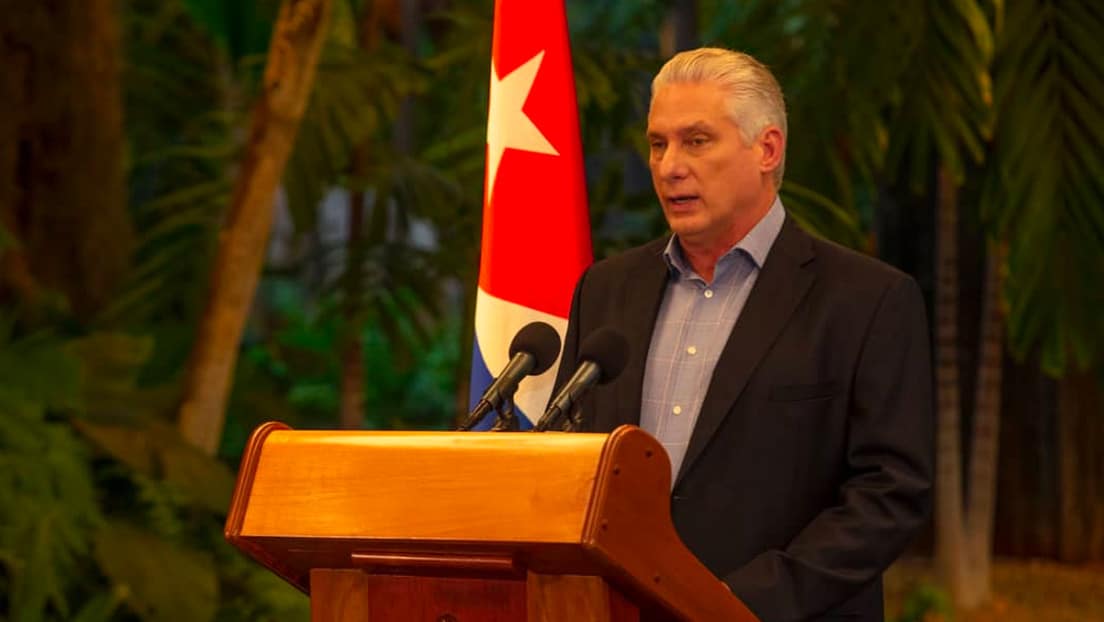
The President of Cuba, Miguel Díaz-Canel. Photo: Twitter/Presidency Cuba.

Orinoco Tribune – News and opinion pieces about Venezuela and beyond
From Venezuela and made by Venezuelan Chavistas

The President of Cuba, Miguel Díaz-Canel. Photo: Twitter/Presidency Cuba.
This Sunday, Cuban President Miguel Díaz-Canel Bermúdez denounced the enemies of the Revolution for trying to take advantage of shortages generated by the economic, commercial, and financial blockade imposed by the United States with aims to destabilize the island.
Through social media, Díaz-Canel confirmed that “amid the blockade that aims to suffocate us, we will continue working in peace to get out of this situation.”
Varias personas han expresado su inconformidad con la situación del servicio eléctrico y la distribución de alimentos.
Este contexto se intenta aprovechar por los enemigos de la Revolución, con fines desestabilizadores.
— Miguel Díaz-Canel Bermúdez (@DiazCanelB) March 18, 2024
He made it clear that “the disposition of the authorities of the Party, the State, and the government is to respond to the claims of our people, listen, dialogue, explain the numerous efforts being made to improve the situation, always in an atmosphere of tranquillity.”
Previously, the Cuban government denounced terrorists based in the United States for promoting violent actions against internal order.
La disposición de las autoridades del Partido, el Estado y el Gobierno es atender los reclamos de nuestro pueblo, escuchar, dialogar, explicar las numerosas gestiones que se realizan para mejorar la situación, siempre en un ambiente de tranquilidad.
— Miguel Díaz-Canel Bermúdez (@DiazCanelB) March 18, 2024
Cuban Foreign Minister Bruno Rodríguez Parrilla held the United States government responsible for the acute situation that impacts the majority of Cubans. The island has been plagued with electricity blackouts and food chain disruptions due to the intensification of the US blockade since 2019.
What happened on Sunday?
In Santiago de Cuba, a group of citizens held a peaceful demonstration in front of the headquarters of the municipality’s Executive Directorate of District 3, asking for electricity and food.
The complaints focused on the imbalance of the electricity supply cuts between neighborhoods and food distribution, particularly milk.
Several officials, including the first secretary of the Communist Party of Cuba in the province of Santiago de Cuba, Beatriz Johnson Urrutia, immediately responded to the protesters.
During the respectful dialogue, it was explained to the protesters that the basic food package was currently being partially distributed. A group of police officers remained at the scene and helped guard the demonstration, talk directly with citizens, and prevent violent events from occurring.
The basic food package includes various consumables distributed at highly subsidized prices. Cuba has reported that it cannot produce these items due to internal obstacles and difficulties acquiring them from abroad due to a lack of convertible currencies and other limitations imposed by the US blockade.
Cuban electrical system status
On Saturday, Cuban Minister of Energy and Mines Vicente de la O Levy told the Cuban News Channel that, in recent weeks, there have been significant disruptions to the electrical service throughout the country due to a shortage of diesel and fuel oil.
This has hurt numerous sectors of the economy. It has prevented electricity from being generated from the distributed generation system, which provides service to large areas of the country. De la O Levy added that the effects will continue because, although the country will have a certain amount of diesel in a few days, it will not have enough fuel oil.
He reported that the Antonio Guiteras thermoelectric plant, the most efficient in the country, will be synchronized with the national electroenergy system on March 18. The minister explained that after maintenance, the plant will be able to reach more power, 280 MW. He stated that this unit generates electricity using Cuban oil, which becomes an advantage in the current situation.
He explained that after the synchronization of the Antonio Guiteras plant, some 40,000 tons of diesel will arrive in Cuba, allowing for several more days of coverage. Its use will be focused during the population’s main rest hours. De la O Levy added that, on subsequent dates, other ships with diesel will arrive at Cuban ports.
De la O Levy said that despite the current shortage, which is also linked to the complex financial situation in Cuba, he will not give up on maintaining the thermoelectric plants, which work with national crude oil and provide the highest percentage of the electricity consumed.
He confirmed that, despite the shortage of foreign currency, Cuba will continue negotiating with different suppliers to arrange new fuel supplies.
In previous appearances, De la O Levy and Cuban Foreign Minister Bruno Rodríguez have explained that the US pressures production, distribution, shipping, and financial companies not to provide services to Cuba and prevent it from acquiring fuel.
“Cuba is not alone”
Venezuelan Minister for Communication and Information Freddy Ñáñez expressed his solidarity with Cuba and stated that, despite the threats, the island has Venezuela’s support.
Venezuela, heavily impacted by a US blockade and illegal sanctions that have kept its population with severe difficulties accessing fuel over the last five years, has provided a steady supply of fuel for the Cuban people. However, the supply is not at the same levels as before 2019, when the Trump administration imposed an unprecedented set of sanctions aimed at ousting the democratically elected government of President Nicolás Maduro.
“Cuba is not alone, President Diaz Canel. In the moments when the empire becomes desperate and intensifies its aggression, the more accompanied and protected it will be by the free world that can only admire and thank the brave and generous [Cuban] people. The infamous group will not pass,” Ñáñez wrote on social media.
(Telesur) with Orinoco Tribune content
Translation: Orinoco Tribune
OT/JRE/SF